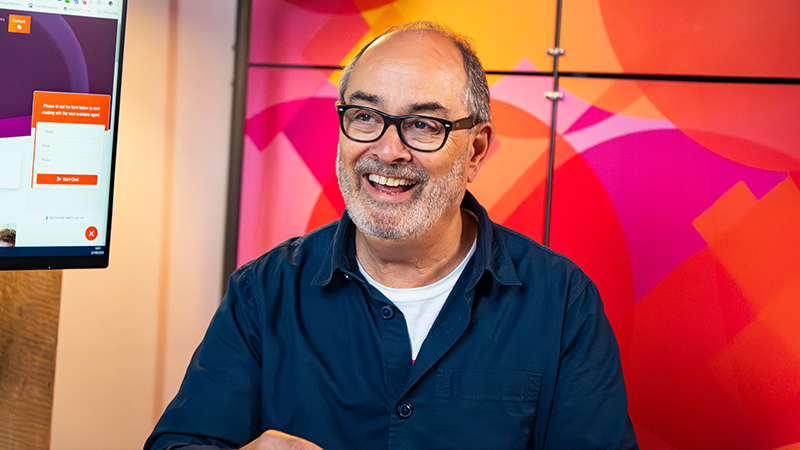Tyne Chease proves you don’t have to choose between ethics and efficiency to scale successfully with AI. Sage Copilot makes space for sustained innovation. This is what high performance looks like in a small manufacturer. The post How does AI help this small business get paid faster? appeared first on Sage Advice UK.
How does AI help this small business get paid faster?
Tyne Chease proves you don’t have to choose between ethics and efficiency to scale successfully with AI. Sage Copilot makes space for sustained innovation. This is what high performance looks like in a small manufacturer.

Adam remembers when Tyne Chease was barely bigger than a household project.
“Tyne Chease was founded by Ami in 2014. I was the second hire, joining in 2017. We worked out of Ami’s parents’ house. Back then, we made Tyne Chease individually. Every single Chease—created one at a time, by hand.”
The scale was small and the work meticulous. Every round was a statement—proof that vegan cheese could be more than oil and starch imitation. Tyne Chease were the first traders in the UK to apply the artisanal craft of cultured cheesemaking to plant-based food—creating something original, flavourful, and satisfying in its own right.
“People would come up, saying how much they loved the products, how it’s what allowed them to become vegan,” Adam recalls fondly. “They’d thank me—‘I couldn’t live without your Chease,’—I’d never felt like that working before.”
Here’s what we cover:
- How missed opportunities shape growth strategy
- The risky realities of running a business
- Celebrating success: Award-winning flavours from an ethical UK manufacturer
- How AI empowers leaders to do more with less
- Why cash flow matters when you can’t buy in bulk
- AI with a human touch: How can small businesses innovate responsibly?
How missed opportunities shape growth strategy
As demand crept up, so did the ambition. Long nights were spent perfecting endless experiments with fairtrade cashew fermentation, and countless taste tests that blurred the line between science and art. Each batch was a leap of faith—a testament to patience, curiosity, and an unwavering commitment to quality.
But pride in their product didn’t shield them from the realities of running a small UK manufacturing business. Margins were tight. Equipment stretched to its limits. Supermarkets came calling before the team was ready.
The company began to feel the weight of its own limitations. Doors were opening faster than they could step through. What had once been a promising kitchen experiment risked stalling—not from lack of public appetite for the product, but from the challenge of keeping up with it.
“We’ve missed out on opportunities,” Adam says. “Supermarkets asked for volumes we couldn’t deliver. We had to turn them down. That’s something we never want to do again.”
A change in leadership, Victoria’s vision
In 2023, Victoria took over Tyne Chease at a fragile moment. The company was shrinking, and she herself was emerging from a period of personal grief and uncertainty, ready to rebuild.
“I’d had a lot of loss in my life, and had come out of work, but I was really struggling with that. I really wanted to get my teeth into something.”
“We were already massive fans of the product,” she tells us. “We’d have it whenever we could—for Christmas, or a cheeseboard night. It felt special. Then I found out Tyne Chease was up for sale, and it seemed like it was supposed to be—the way everything aligned.”
She invested in a product she trusted, matching her own resilience with the company’s early tenacity and together they carved a new future.
The risky realities of running a business
Shoulder to shoulder, CEO Victoria Inskip and GM Adam Williams lead a small crew. They faced the same pressures every small business recognises, like late nights worrying about cash flow, the pressure of suppliers and payroll, and the endless list of admin-heavy tasks no one trains you for. Sales, operations, logistics, finance, HR—all pressed into just a few hands. Moments of doubt when the weekly numbers looked fragile, and moments of loneliness when decisions felt bigger than the team around them.
When another vegan business disappears, they feel the weight of it—a reminder of how fragile the sector can be. “Every week it feels overwhelming,” Victoria shares. “There’s been loads of vegan businesses that don’t exist anymore. I don’t want that to happen to Tyne Chease.”
Isn’t that the paradox of entrepreneurship? That risk and fear live right beside purpose?
Scaling before you’re ready
In defiant opposition to the idea of giving up, those earlier missed chances with supermarkets became the lessons they followed.
The company took bold steps, moving into a factory bigger than they could fill, overhauling production so they could scale quickly.
Costly and uncomfortable moves, especially for a small business, but they shifted Tyne Chease’s horizon.
Empty space in the factory became room to grow. Processes built for scale became proof they could meet demand the next time it came knocking. What once felt like a ceiling now looked like a runway.
Celebrating success: Award-winning flavours from an ethical UK manufacturer
For their small-yet-mighty team, the reward of these risks has been crafting Chease so delicious that vegans and non-vegans alike could savour and celebrate it.
“My favourite flavour?” Adam grins. “It has to be Marinara. I’m biased, because it’s the one I came up with. It’s a bit of a running joke in the office—we all claim ours is the best—but mine genuinely is one of the better sellers.”
Victoria laughs at that. “Marinara is really, really good—Adam’s recipe. But my nacho Chease sauce? I’ll just scoop it straight from the tub and eat the lot. Nacho is my favourite.”
The awards just keep rolling in. Recently, Tyne Chease’s ‘Flavoured Cheese Selection’ won Silver in the 2025 Free From Food Awards, a notable achievement in one of the industry’s most competitive categories.
Is company culture the secret ingredient of success?
New flavours and new strategies have made a world of difference, but like the Chease, what’s truly kept the business thriving is culture.
“Although I’m the CEO, you’ll usually find me in the kitchen,” Victoria smiles, proudly. “Adam’s the same. We all support each other and try to have fun. I don’t want it to be a place people dread coming into work. Keeping morale high is the most important thing.”
For Tyne Chease, their philosophy of leadership treats culture as thesource of stamina.
Joy at work fuels the risks and recoveries that make it possible to keep creating, scaling, and imagining what comes next.
For Victoria and Adam, that’s getting it onto supermarket shelves, on a mission to prove that the future of food doesn’t just belong to the biggest players—it belongs to those who can combine tradition with both conviction and innovation. A recipe for success.
How AI empowers leaders to do more with less
Though she’s a highly skilled and successful CEO, Victoria admits she’s not much of an accountant. The finance side of business could’ve been the thing that broke her momentum. “I inherited Sage when I took over the company. I’m not any good at accounts. But Sage is really easy to use. I don’t think I would have been able to do it if it had been any other software.”
“If you took Sage away,” Victoria continues, “there’d probably be piles of paper, with me just rocking in a corner in the office. Sage is a part of everyday life at Tyne Chease.”
“Every morning when I do admin, it’s Sage Copilot,” she says. “It’s like my little personal assistant, telling me what needs addressing, what needs to be prioritised. It even drafts emails and suggests tones—friendly or firm. It’s been really helpful.”
Ask Adam where Sage Copilot makes the biggest difference, and he doesn’t hesitate: “The main time consumer previously was chasing up invoices. Now, I go on at the start of the day and I get a summary of what is overdue, then it will automatically draft emails to chase those up for me, like an assistant.”
Why cash flow matters when you can’t buy in bulk
“Everyone’s just trying to get one thing paid so they can pay another,” Adam explains. Tyne Chease can’t buy in bulk or hold much stock, so every supplier relationship is vital. One missed payment and the knock-on effect ripples through production and sales.
Sage Copilot changes the tempo. “Now that Sage Copilot prompts and automates a lot, we get paid much quicker,” Adam says; “previously, invoices were getting paid up to a week—seven full days—later than they needed to be.”
For Adam and Victoria it’s a relief. Sage Copilot is a dependable sidekick that lifts the weight of draining tasks, giving them space to focus on the parts of the business that excite and inspire them.
“During a typical week, Sage Copilot now saves about 12 to 14 hours, which, for our team, is a huge amount of time.” Every hour saved is an hour they can put back into projects that clear their path to supermarket shelves.
Lower prices for customers
They’ve already used that time to have their first audit, which Adam tells us was “largely passed due to the time saved,” it’s this kind of milestone that clears the way for bigger opportunities ahead.
“We have a lot of loyal customers who love the products,” Adam says. “But we want to make it more accessible. A lot of people have a limited food budget, and we want them to be able to enjoy the Chease.” For Victoria, affordability ties directly into her vision. “My aim is for people to get it in their weekly shop. We were the first in the UK, but it feels like the newbies have taken over. I want to catch up or overtake them.”
With help from Sage Ai capabilities, Adam recently ran a full cost review. “We brought one range down from £6.20 to £5.49. Another from £7.70 to £6.29. Same product, same amount, just more affordable.”
Sage is the tool that frees their small team to operate at its best—to think bigger, move faster, and make Chease that isn’t just delicious, but within reach of more people than ever before.
AI with a human touch: How can small businesses innovate responsibly?
What sets Adam and Victoria apart is not just what they do with the tools they have, but the perspective they bring to them. While many treat AI as a side experiment, they’ve woven it into the fabric of how Tyne Chease runs day to day.
“I know AI can be controversial,” Victoria says. “I’d never want it to replace the human aspect of a job. But it’s a really good tool to enhance the work people are doing. It’s night-and-day difference.”
Adam looks ahead. “What excites me is how AI is moving towards autonomy. You’ll be able to give it tasks and it’ll just do them. Not to replace people, but to let humans do more creative work while AI handles the repetitive tasks.”
It’s an outlook that resonates with many small-business owners: embracing new technology as a safety net rather than a shortcut.
Clear policies and confident leadership
Their approach to AI is defined by a lens of responsibility. Adam frames it in practical terms: “Every hire is a big commitment. AI helps increase productivity before we take on new staff, so when we do, the jobs are stable.“
He’s mindful to call out the need for guardrails: “Businesses need clear policies about how data is used. Confidential information shouldn’t be identifiable or used to train systems without consent.”
That balance—ambitious about possibility, insistent on responsibility—is where their leadership stands out.
The forefront of ethical tech conversations
Tyne Chease are showing how a small manufacturer can be at the forefront of an ethical tech conversation usually dominated by global giants.
It’s the kind of leadership the future demands:open to technology, grounded in people.
For Adam and Victoria, being at the top of their game isn’t just about making great vegan cheese. It’s about proving that small businesses can adopt new tools with as much integrity as innovation.
Their philosophy is simple: ethics aren’t a limit, they’re the ingredient that keeps Tyne Chease resilient, relevant, and ready to move forward, one round at a time.
Sage Copilot. Your dedicated AI-powered productivity assistant
Step into a new business era with Sage Copilot, built on over 40 years of experience supporting British businesses like yours. Get work done faster with real insights, fewer errors and less admin.

The post How does AI help this small business get paid faster? appeared first on Sage Advice UK.




.jpg)









